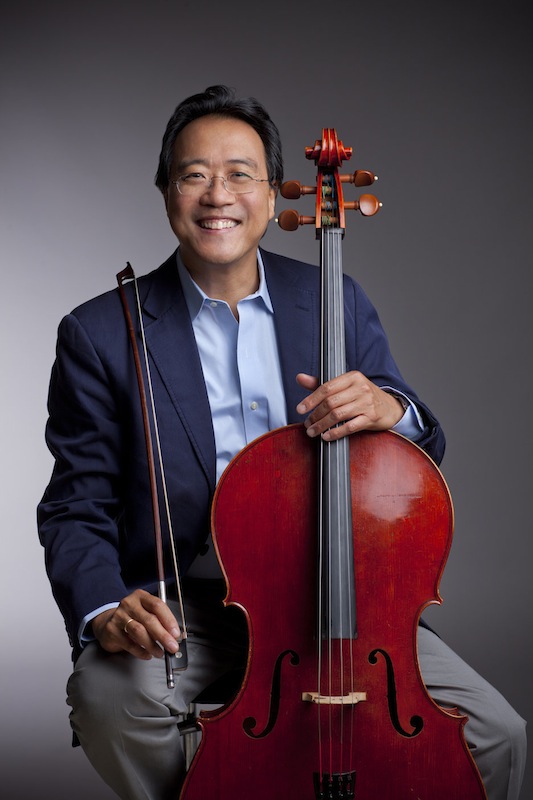Yo-Yo Ma and friends explore music of the BRIC road

Yo-Yo Ma performed with members of his Silk Road Ensemble Sunday night at the Arsht Center. Photo: Todd Rosenberg
Yo-Yo Ma is one of the few classical artists to move beyond the elite world of the concert hall and become an icon of wider popular culture. That he has attained rock star status was confirmed by the huge line at the ticket counter in the lobby of the Arsht Center’s Knight Concert Hall on Sunday night.
Ma is one of the world’s great cellists and an inquisitive musician who has explored both familiar and less traveled paths of the repertoire as well as commissioning new works. He is also an unabashed entertainer. His crossover and cross-cultural collaborations have attempted to fuse diverse musical traditions.
Titled “Musical Perspectives on the Cultures of BRIC” (music from Brazil, Russia, India and China), Sunday’s presentation featured members of his Silk Road Ensemble plus longtime pianist-collaborator Kathryn Stott and the formidable guitar duo of Sergio and Odair Assad.
Both sides of Ma were on display. Serving as a genial host, Ma opened the evening with a cello transcription of Faure’s song After the Dream which he dedicated to the victims of the recent tragic events in Paris. He brought out the song’s melodic line with controlled emotion, varying the instrument’s tonal colors.
The third and fourth movements of Shostakovich’s Piano Trio No. 2 were even more appropriate at this time of mourning for the dead. This work finds Shostakovich at his most desolate. Written in 1944, the trio is a musical commentary on the horrors of the Holocaust (and perhaps Stalinist terror).
Abrupt piano chords introduce a bleak melody first played by solo violin, then in a duo with cello. Violinist Johnny Gandelsman’s pure, clean intonation and spare vibrato mixed with Ma’s dark-hued tone but the music’s inner darkness was always present. The succeeding Allegretto begins with a klezmer-like melody, at first softly plucked, then given full force. With Stott playing at full intensity, the two string players reached a peak of frenzy before the quiet coda, the music’s sadness achingly conveyed.
Gandelsman also soloed in the folk-infused Chanson Russe, a piece so soft and intimate that one would never guess the composer was Stravinsky.
Stott, a recital and chamber music partner of Ma for 30 years, was the real heroine of the evening. Whether playing Shostakovich with torrential power, conjuring Brazilian rhythms with the ease of a jazz pianist or parsing the modernist predilections of Terry Riley, she was a tower of strength, informed by subtle artistry.
Terry Riley is considered the father of minimalism. In Turning he attempts to combine the music of northern India with his own style. Clearly “trance music,” the appealing beat of the tabla, background of two guitars and the repetitive piano motif are indeed enchanting. The Assads and tabla master Sandeep Das managed the tricky rhythms adroitly.
Madness on the Moon was a more typical Silk Road piece, sounding like a Chinese attempt at writing country music. Arranged by sheng player Wu Tong, the result was rather corny and contrived but the audience loved it, leaping to their feet at the last notes. Anton Webern seemed to lurk beneath Zhao Jiping’s Moon Over Guan Mountains, the terse fragments of the piano and sheng suggesting atonality.
Two traditional Indian songs arranged by Evan Ziporyn ranged from dronelike austere chords to middle-brow pop with Tong turning crooner for the vocals. Gandelsman and Stott exhibited the jazzy ease and acuity of cafe players for Milton Nascimento’s Milagre dos Paixes, the Assads coming into their own with brilliant fingerwork.
Amplification was utilized throughout the program. From the front orchestra rows, balances were well coordinated and the audio was bereft of harshness but the string timbres sounded inevitably enlarged.
The Arsht Center Classical Series continues with Peter Oundjian conducting the Toronto Symphony in John Estacio’s Wondrous Light, Rimsky-Korsakov’s Scheherazade and Beethoven’s Piano Concerto No. 4 with soloist Jan Lisiecki 8 p.m. January 7, 2016 at the Arsht Center in Miami. arshtcenter.org
Posted in Performances
Leave a Comment
Mon Nov 16, 2015
at 2:41 pm
No Comments






